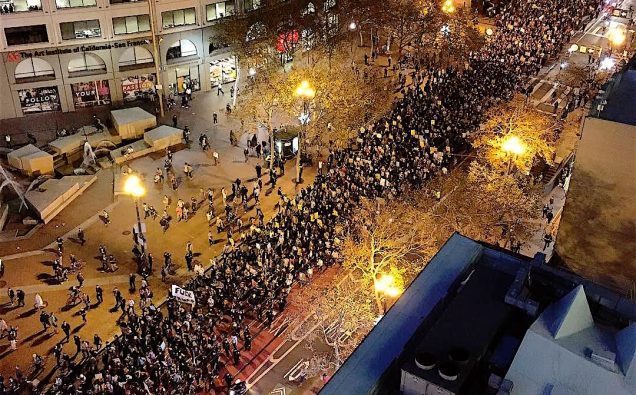
In the days since the election of Donald Trump, unusually sharp and negative reactions have come from Americans who opposed his promises during the campaign, and who fear that those promises may now become government policies.
Starting the day after the election last Tuesday, demonstrations have been held in cities across the country – in Chicago and New York, Miami and Kansas City, Nashville and Minneapolis, Detroit and Iowa City.
Ranging in size from a few hundred to several thousand, the demonstrations have been largely peaceful, with occasional confrontations with police that have resulted in arrests.
Those who have marched down city streets have blocked traffic, chanted anti-Trump slogans, and held up signs protesting his election and his divisive campaign positions on women, Muslims, and immigration. The demonstrators have been mainly young, multi-racial, and angry – upset, as one young woman in Denver said, that “racism, xenophobia and homophobia have become so powerful.”
In a familiar reaction to criticism that came so often during the long and bitter campaign, Trump initially responded to the demonstrations on his Twitter feed, blaming them on “professional protesters” supported by an unfair media.
Within hours, however, Trump sent out another Twitter feed reversing his critique and praising the marchers for loving their country.
This conflicted response follows a pattern established by Trump during the long and raucous campaign. Controversial positions loudly stated at enthusiastic rallies were repeated often – but then occasionally modified in interviews, then re-emphasized at rallies, then modified again. He has long favored unpredictability as a style – as a businessman, and as a presidential candidate – and, drawing from statements during this initial transition period, it looks like that will continue.
For example, on the campaign trail Trump often pledged to repeal President Obama’s signature health insurance program on his first day in office. After a post-election meeting with Obama at the White House, Trump told the Wall Street Journal that he may keep parts of it – saying “I like those very much” – and work with Congress on further modifications.
In the campaign’s closing weeks he told supporters at rallies that Hillary Clinton should be in jail because of alleged misuse of classified materials, and while his supporters chanted “lock her up” he said he would appoint a special prosecutor to press the case.
In his Wall Street Journal interview, though, he said he hasn’t given it much thought, and told CBS that he has congratulated Clinton for being “a great competitor”, calling her “very strong and very smart.”
There have been other statements by Trump advisers indicating he may modify earlier unequivocal positions on the wall along the Mexican border, mass deportation of illegal immigrants, and a ban on Muslims entering the United States.
Firm positions on all of these issues – and others, including foreign policies, the domestic economy, and jobs programs – remain to be seen.
High above the noise of demonstrations in the streets, transition planning continues at Trump Tower in New York, as the President-elect and his gradually growing inner circle of advisers make plans and consider candidates for top jobs in the new administration. Meanwhile, demonstrations in Los Angeles, Las Vegas, and other cities were scheduled to take place in the days ahead.
Going forward, Washington will have to offer much to the nation, and work more closely than ever before across the political spectrum in order for Americans to move beyond a long bitter and divisive political season.


















